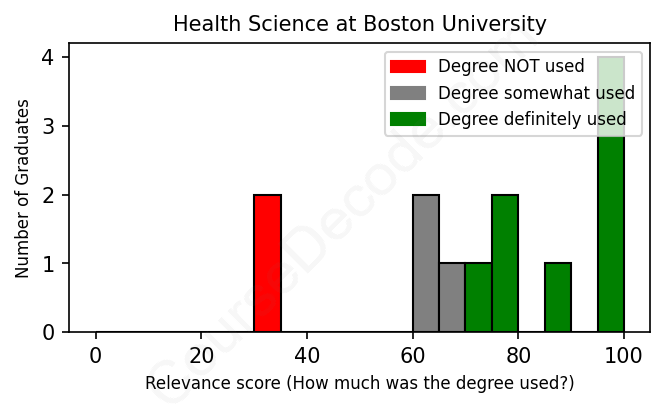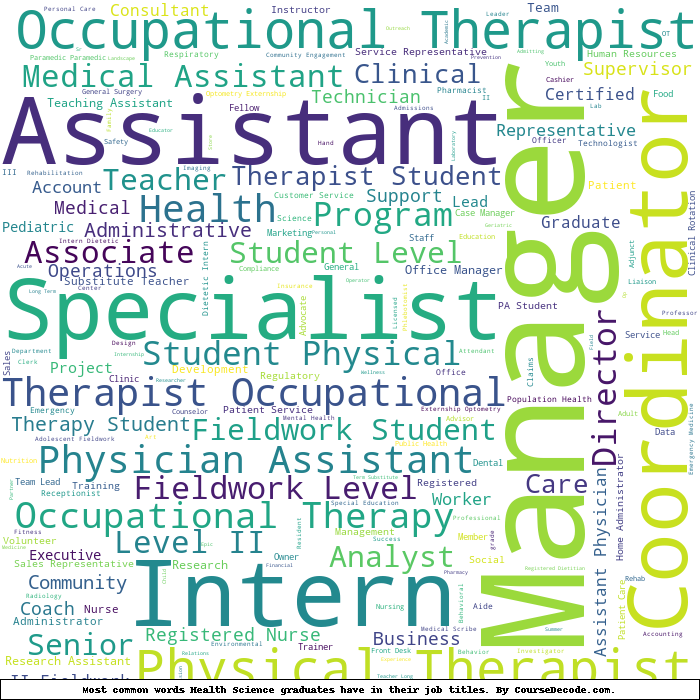
First, some facts. Of the Health Science graduates from Boston University we've analyzed , here's how many have used (or NOT used) their degree in their career:

These are estimates based on AI analysis of 13 LinkedIn profiles (see below).
The verdict? Above average. Overall, with an average relevance score of 74%, Health Science graduates from Boston University have a higher likelihood (+7%) of finding work in this field compared to the average graduate across all fields:
And for comparison, here's the chart for all profiles we've looked at across all degrees.
Also, after graduating, 69% of these graduates have pursued further education other than another Bachelor's degree (such as a Masters degree or other), compared to the average across all profiles of 35%. This suggests you may need more than just a Bachelors degree to be competitive as a Health Science graduate.
See the details:
|
Relevance score: 62% We think this person has gone into a career only somewhat relevant to their degree. We think this person has gone into a career only somewhat relevant to their degree.
DEGREE INFOGraduated in 2016 from Boston University with a Bachelor of Science (BS) in Health Science. Also pursued further education since (see below). JOB HISTORY SINCE GRADUATIONAssistant Innkeeper The Beech Tree Inn Jun 2016 - Jun 2019 Occupational Therapist  Massachusetts General Hospital Jul 2019 - Present FURTHER DEGREES DONE SINCE GRADUATINGDoctor of Occupational Therapy (OTD)MGH Institute of Health Professions 2016 - 2019 ABOUTNo information provided. |
The top 10 most common jobs done by the graduates we've analyzed (ranked most common to least) are:
When looking at the job histories of Boston University Health Science graduates, it's clear that many have found their way into roles closely aligned with their field of study, particularly in areas like occupational therapy, physical therapy, and regulatory affairs. Many graduates have taken on positions such as Occupational Therapists and Physical Therapists, which are highly relevant and require direct application of health science knowledge. These roles not only tap into the core competencies of their degree but are also critical in contributing to patient health and rehabilitation. There are also a good number of graduates who ventured into regulatory roles, where they can ensure that health products and services meet necessary standards, again leveraging their education effectively.
However, not all job paths taken by these graduates are directly related to health science. For instance, several have entered roles such as sales representatives, business analysts, and even restaurant staff, where the daily tasks don't really call for the specialized health science knowledge they acquired in their studies. This mix shows a broad spectrum of career choices among the graduates, highlighting that while many do stick to health-related fields, others find themselves in positions that don't fully make use of their degree. Overall, it's a blend of relevant and less relevant jobs in the landscape surveyed, with a solid base of graduates successfully applying their education in meaningful ways in the health sector.
Here is a visual representation of the most common words in job titles for Health Science graduates (this is across all Health Science graduates we've analyzed, not just those who went to Boston University):

Graduates from Boston University's Health Science program seem to journey down a mix of healthcare-related and more varied career paths after graduation. For many, their first jobs tend to be closely aligned with health fields, often starting out in entry-level roles like rehabilitation aides, care managers, or even internships within health organizations. As we look at their trajectories five to ten years later, it appears that most of these individuals have advanced within health science sectors, securing roles as occupational therapists, regulatory affairs managers, or other specialized positions in healthcare. It's great to see that many are finding themselves in meaningful careers that directly relate to their degrees.
However, not everyone stays strictly on the health science track. Some graduates have explored completely different fields, such as sales, business management, and even teaching. For instance, a few have taken paths that lead to roles like account managers or business owners, indicating that while they may have started in the health science realm, they drifted into other domains. This blend of career choices showcases the versatility of a Health Science degree. Overall, it seems that whether they stick to health-related careers or branch out into other fields, Boston University graduates are making significant strides in their professional lives.
So, getting a Bachelor’s degree in Health Science, especially at a school like Boston University, can be a bit of a challenge, but it really depends on your background and interests. Health Science programs typically mix science courses—like biology and chemistry—with more applied subjects, which means you’ll need to balance lab work, lectures, and maybe even some fieldwork. It’s not the easiest degree out there; it definitely requires some dedication and good study habits, but if you’re genuinely interested in the material and willing to put in the time, you can definitely handle it. Just be ready for some late-night studying and maybe a few stressful moments around exam times!
Most commonly, in the LinkedIn profiles we've looked at, it takes people 4 years to finish a Bachelor degree in Health Science.
Looking at these Boston University Health Science grads, it seems like they've landed some pretty solid positions, especially those who graduated a bit earlier. The first grad became an Occupational Therapist, which usually pays well, especially as they gain experience. Others, especially those in healthcare management and research roles at places like Mass General Brigham and Northwestern University, are likely doing quite nicely, too. Even the newer grads are getting into internships and analyst roles, which can be stepping stones to good salaries. Overall, while there are some leaps in career paths for a couple of them, it looks like most are on a decent path to making good money in health-related fields.
Here is a visual representation of the most common words seen in the "about" section of LinkedIn profiles who have a Bachelor degree in Health Science (this is across all Health Science graduates we've analyzed, not just those who went to Boston University). This may or may not be useful:

Here are all colleges offering a Bachelor degree in Health Science (ordered by the average relevance score of their Health Science graduates, best to worst) where we have analyzed at least 10 of their graduates:
| College | Score | Count |
|---|---|---|
 Northeastern University Northeastern University
|
86 | 15 |
 Stony Brook University Stony Brook University
|
79 | 12 |
 Boston University Boston University
|
74 | 13 |
 Stockton University Stockton University
|
68 | 10 |